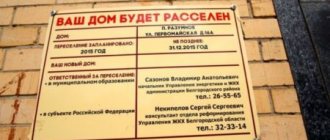What does the law say?
The Housing Code of the Russian Federation regulates the problem of legal use of living space , naming the grounds for expelling residents from an apartment (including service, municipal, non-privatized, dormitory).
Article 90 of the Housing Code states that in the event of six-month non-payment of communal services for municipal housing, its residents may be evicted, but with the provision of another rented living space.
Article 85 of the Housing Code contains a list of other conditions for discharge: use of living space for other purposes (shop, warehouse, etc.); living in a house subject to demolition; transfer of housing rights to religious sects; illegal redevelopment with a change in area.
For non-payment of utility bills, the law does not give the right to eject the owner from privatized real estate; a fine is imposed for this, and other grounds are required for eviction (Article 32 of the Housing Code): the house is subject to demolition due to the needs of the state (in this case, the state is supposed to buy the apartment from the owner ).
Article 91 of the Housing Code of the Russian Federation regulates the removal from a communal apartment: for violation of the interests of neighbors and mismanagement of the apartment, the landlord first issues a warning to the tenant indicating the deadline for his correction. The next authority, if the tenant’s behavior does not change for the better, is the court, which can order an extreme measure - eviction without providing other housing.
Articles 90, 91 and 103 talk about the grounds for eviction from official housing: in connection with termination of the rental contract; for debts (other living space is provided); due to violation of the rules of residence (through the court, other housing is not provided).
According to the law, a tenant can be evicted from the premises if the lease term has expired, rent has not been paid, its rules have been violated, or property has been damaged. Forced expulsion of a tenant, as well as a tenant, is possible only through the court.
Article 31 of the Housing Code talks about the legality of eviction of a former spouse if the apartment is not his property.
The prosecutor has the authority to authorize eviction. This decision can be appealed in court.
The grounds are also provided for by the following articles of the RF Housing Code: , , 133 .
Eviction from a municipal apartment
To terminate a social tenancy agreement with a tenant in an area transferred for the use of a citizen by a municipal authority, the following grounds are provided:
- accumulation of debt for more than 6 months;
- damage to the premises by the tenant, his relatives or friends;
- use of an apartment or room in a communal apartment for other purposes;
- violation of the rights of neighbors, creation of conditions for unbearable living nearby, damage to their property, threats of physical violence, constant emotional pressure;
- violation of the purpose of using the premises, placement of production or warehouses, shops, or other commercial activities in it;
- destruction of a residential building, violation of its integrity by any means, which entails the destruction of property;
- change of purpose of the premises - transfer from residential to commercial by decision of municipal authorities ;
- recognition of a property as threatening collapse or collapse when issued by the relevant authority by the district administration.
In the above cases, deprivation of the right to use the premises does not require a court decision. Eviction is carried out in connection with regular violation of obligations in connection with the use of housing transferred for resettlement on the basis of orders from municipal authorities.
Expert opinion:
It should be noted that when a citizen is evicted from a social housing fund due to a violation of the rules for its use on the basis of Article 91.12 of the Housing Code of the Russian Federation, no other premises are provided.
Ignatieva R.E., bailiff
What are the reasons?
If the person who signed the tenancy agreement or one of his family unauthorizedly uses the apartment other than as a living space, the rights of neighbors are violated by them, the living space is not properly maintained, and all these violations are not corrected after a warning from the landlord, the tenants may be discharged after a decision court, they will not be provided with housing in return .
What does the law say about eviction from an apartment of a person deprived of parental rights ? Such a citizen, subject to a court prohibition from living with children, must be evicted from the apartment where the children live. Read about how the eviction of minors occurs and whether it is possible here.
A tenant living with a family who does not make payments for six months is evicted after a lawsuit. The family is offered other housing, the size of which corresponds to the living space in the hostel.
After eviction, they offer (under a rental agreement) other housing in the following cases:
- The house must be demolished.
- It is planned to transfer the apartment to a room with a different functional purpose.
- The apartment receives the status of non-residential premises.
- The living space is not suitable for safe living of residents.
- During major repairs or reconstruction work on a house, it is not possible to maintain the same area. The norm for providing the number of square meters per person will not be observed.
- By law, the apartment must be transferred to a religious organization.
Introduction
A citizen, having worked for 20 years at one of the enterprises in St. Petersburg, never received an apartment in turn, and found himself in a difficult situation. The administration of one of the districts of St. Petersburg filed a claim in court to evict a citizen from the occupied premises with the provision of another residential premises. For a long time, a citizen was allocated first one room in a dormitory, then another, but all this was not officially assigned, he was only included in Form 9 for a communal apartment. The very status of the house - a hostel - whether it is or not is also not clear. For 6 years, the citizen tried through the court to get a social rental agreement concluded with him for a room, but he lost in the courts and so our Administration filed a lawsuit to evict the citizen!
The administration, taking into account the rules that it is impossible to evict a citizen who has worked for 10 years at an enterprise without providing living quarters ( Part 1 of Article 108, Article 110 of the RSFSR Housing Code ), provided him with a room in a dormitory, but the size of the room was 11 sq.m. , and the distance from work is approximately 1.5 hours.
Types of eviction
According to the consequences:
- Providing residents with comfortable housing in return.
- With the provision of new unfurnished living space.
- No offer of housing in return.
According to the authority issuing the permit:
- By court order.
- Administrative eviction (prosecutor's decision). Its reasons: a house collapse may occur; the tenants illegally occupied the living space. You can appeal in court.
Who can evict from an apartment? The owner of the living space, the municipality and the organization that is the renter.
Voluntary
It is impossible to forcibly discharge persons who receive alimony; persons who have the same rights to use the apartment as those who wish to evict them.
A person voluntarily moving out should write an application to the passport office (form and sample to fill out).
After 3 days, as soon as the application is considered, he will be discharged. A note indicating deregistration will be made in your passport.
Forced
You can evict a person without his voluntary consent through the court or after appointing a prosecutor .
How does eviction work? To begin with, the plaintiff writes a statement, to which he attaches evidence that he is the owner and pays the state fee.
The court makes a decision, based on which the passport office issues an extract.
Often, consideration of cases of forced eviction of tenants is delayed for several months. The owner receives a positive court decision only if he proves that a violation was actually committed.
But if the tenant does not have his own home and confirms his status as a low-income citizen , the contract will most likely be extended for a year, despite the violations.
If the tenant has been registered , a court decision that is positive for the owner must be taken to the passport office so that the citizen can be deregistered. Further, if the tenant does not want to comply with the court decision, bailiffs act.
8 reasons for eviction from an apartment
How to legally evict tenants from your own apartment (procedure)
In order to forcibly (if a voluntary option is not possible) evict a tenant, the owner of the property should file an application with the court . The tenant is first notified in writing by the owner of the upcoming legal action.
The owner must keep a copy of the letter along with a receipt for its payment (this evidence may be useful in court).
The tenant has been warned, but does not agree to leave voluntarily - we are filing a lawsuit. The application must be accompanied by a rental agreement (copy) and a document on ownership (copy).
The court will also require documents that confirm the identity of the owner.
The applicant must document the violations made by the tenant. Such evidence may include photographs, police reports (copies), or unpaid bills. The applicant's claims can be confirmed by the testimony of neighbors.
How to file a claim?
At the beginning of the claim there must be details of the court, the plaintiff, the defendants (defendant) and other persons (if any), and the name of the application.
The main part contains a list of the grounds for eviction (marriage dissolved, the rental period specified in the contract has expired, etc.). It is necessary to indicate that the housing is owned. The circumstances under which citizens were moved into the apartment are prescribed.
The main part should say that the residents have been repeatedly warned in writing about the need to be discharged, but are not going to voluntarily leave the premises. This part should contain information about witnesses (if any) who are ready to confirm your words.
At the end of the main part, articles of the Code of Civil Procedure of the Russian Federation are indicated: 131, 132, in accordance with which the application is drawn up.
The operative part of the document includes a requirement to evict a tenant (or several tenants) from the living space owned by the plaintiff (the exact address of the housing must be specified).
If there are witnesses, the operative part must contain petitions to summon them to court (names, addresses and other contact information about the witnesses are indicated).
The document is completed by the date of filing the statement of claim, the signature of the apartment owner (plaintiff) and a transcript of the signature.
There must be 1 more copies of the application than the number of respondents.
The following documents must be attached to the application:
- about ownership (copy);
- confirmation of the beginning and end of family relationships (copy);
- rental agreement (copy);
- notification of the tenant about the need for his discharge (it must contain his signature or a note that the recipient refused to sign the document);
- receipt of paid state duty (original).
Original documents, except the receipt, are presented directly to the judge.
Form of claim for eviction.
Commentary on Article 35 of the RF Housing Code
1. The eviction of citizens whose right to use residential premises has been terminated, as well as citizens who violate the rules for using residential premises, is carried out exclusively by court decision.
The legal basis for termination of the right to use residential premises is most often the expiration of the period for which such premises were provided for use. Eviction cases are considered with the participation of the prosecutor, however, the failure of the prosecutor notified of the time and place of consideration of the case is not an obstacle to the consideration of the case (Part 3 of Article 45 of the Code of Civil Procedure of the Russian Federation).
In the event that the debtor has not vacated the residential premises within the established period for the voluntary execution of the demand for eviction contained in the executive document, the bailiff issues a resolution to collect an enforcement fee from the debtor, sets the debtor a new deadline for eviction and warns him that After the expiration of the specified period, forced eviction will be carried out without additional notification to the debtor.
Eviction includes the release of the residential premises specified in the executive document from the evicted person, his property, pets and the prohibition of the evicted person from using the vacated premises. Eviction is carried out with the participation of witnesses (if necessary, with the assistance of internal affairs officers) with the drawing up of an eviction act and an inventory of property.
The bailiff, if necessary, ensures the storage of the property of the evicted debtor, with the burden of expenses incurred on the debtor. If within two months from the date of eviction the debtor has not collected the specified property, then the bailiff, after warning the debtor in writing, transfers the specified property for sale in the manner established by the legislation on enforcement proceedings.
The proceeds from the sale of the debtor's property and remaining after reimbursement of enforcement costs are returned to the debtor. Funds not claimed by the debtor are stored in the deposit account of the bailiff division for three years. After this period, the specified funds are transferred to the federal budget (see Article 107 of the Federal Law of October 2, 2007 N 229-FZ “On Enforcement Proceedings” <1>). ——————————— <1> NW RF. 2007. N 41. Art. 4849; 2008. N 20. Art. 2251; 2009. N 1. Art. 14; N 23. Art. 2761; N 29. Art. 3642; N 39. Art. 4539 - 4540; N 51. Art. 6162.
2. Rules part 2 art. 35 of the Code are applied in cases where: a) the right to use residential premises belonging to the owner is reserved for a former member of his family for a certain period on the basis of a court decision according to the rules of Part 4 of Art. 31 Code; b) the right to use residential premises belonging to the owner arose with the citizen-user on the basis of a testamentary refusal (Article 33 of the Code).
In cases where a person using residential premises for the specified reasons commits the violations listed in Part 2 of Art. 35 of the Code, the owner of the relevant premises, before going to court, must fulfill the requirements established in the norm in question. After this, he has the right to apply to the court to evict the specified person. If the court satisfies this request of the owner, eviction is carried out according to the rules of enforcement proceedings (see commentary to Part 1 of Article 35 of the Code).
In judicial practice, the question arose in what form the warning provided for in Part 2 of Art. 35 and part 1 art. 91 of the Code, so that in case of non-compliance there will be grounds for eviction of the citizens specified in these articles at the request of the owner or landlord? The Presidium of the Supreme Court of the Russian Federation explained that since the law does not require any specific form in which a warning must be expressed by the owner or landlord, in the event of a dispute arising over the eviction of citizens on the grounds provided for in Part 2 of Art. 35 and part 1 art. 91 of the Code, any evidence may be presented to the court that indicates both violations committed by citizens in relation to residential premises, and that guilty citizens have been warned about the need to eliminate such violations (see Review of legislation and judicial practice of the Supreme Court of the Russian Federation for the first quarter of 2006, approved by the Resolutions of the Presidium of the Supreme Court of the Russian Federation of June 7 and 14, 2006 <1>). ——————————— <1> Bulletin of the Supreme Court of the Russian Federation. 2006. N 9.
General procedure for a bailiff
Studying a court decision and a writ of execution , issuing a decision on enforcement proceedings - all these are the tasks of a bailiff. Written notifications to the owner and tenants of his living space that enforcement proceedings have been initiated.
Ensuring the presence of tenants in order to resolve the issue without forced eviction.
If the tenants refuse to comply with the court's demand and voluntarily vacate the living space, a decision is made to collect an enforcement fee. The bailiff must personally serve the tenants with notice of the time within which they need to vacate the premises.
The deadline has passed, but the tenants have not left the premises - the task of the bailiff is to forcibly evict the tenants . During the process, 2 people (witnesses) must be present who are not interested in how the procedure will end.
The bailiff must draw up an act with the signatures of all participants in the process and an inventory of all the things of the evicted residents, indicating where they are stored. If housing is not offered in return, things are stored in special premises. The property is not retained.
At the end of all actions, a decision must be made that the enforcement proceedings are completed.






